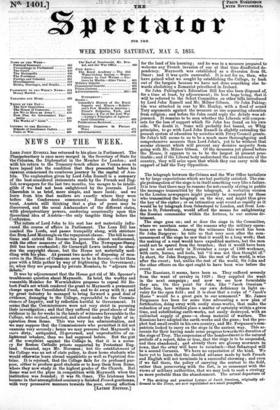NEWS OF THE WEEK.
LORD JOHN RUSSELL has returned to his place in Parliament. The Plenipotentiary is once more merged in the Secretary of State for the Colonies, the Diplomatist in the Member for London; and with his return to the Treasury-bench affairs at Vienna seem to have laPsed into the condition that they presented before his Caravan commenced its cumbrous journey to the capital of Aus- tria. The explanation given by Lord John Russell is a summary of the best-considered statements made by the French and Eng- lish newspapers for the last two months, too meagre to be intelli- gible if we had not been enlightened by the journals. Lord Clarendon is as brief, more simple, and more lucid; and we learn from him that matters are exactly where they were before the Conferences commenced ; Russia declining to treat, Austria still thinking that a plan of peace may be discovered, and the usual Ambassadors of the different states, with plenipotentiary powers conferring occasionally upon this theoretical idea of Austria—the only tangible thing before the Conference.
The return of Lord John to his seat has not materially influ- enced the course of affairs in Parliament. The Loan Bill has reached the 'Lords, and passes tranquilly along, with stricture sine from Lord Monteagle on the repayment. clause. The bill to con- tinue and extend the Income-tax proceeds almost undiscussed, with the other measures of the Budget. The Newspaper-Stamp Bill has been overhauled; Sir Cornewall Lewis induced to aban- don the copyright clause, but the House not materially med- dling with his plan. At present two modes of disposing of mea- sures in the Rouse of Commons seem to be in favour,—to let them pass with a little pother by way of frightening the Government ; or, when they are proposed by private Members, to "adjourn the debate."
It was by adjournment that the House got rid of Mr. Spooner's troublesome question about Maynooth. In brief, the worthy and venerable Member for Warwickshire proposes to repeal Sir Ito- bert Peel's not which rendered the grant to Maynooth a permanent charge upon the Consolidated Fund, and to do away with it ; and by great industry he managed to bring forward a good deal of evidence, damaging to the College, reproachful to the Commis- sioners of Inquiry, and by reflection hurtful to Government. It seems that the Commissioners were not very strict in pursuing their investigation ; and that they suffered the proof-sheets of the evidence to lie for weeks in the hands of witnesses favourable to the College, who revised; corrected, and altered under the light of in- spiration from Rome. This was very lax administration, and we may suppose that the Commissioners who permitted it did not examine very severely; hence we may presume that Maynooth is snore dirty, antiquated, ill-governed, and unproductive of en- lightened scholars, than we had supposed before. But the gist of the complaint against the College is that it is a nurse. ry for Riniian. Catholic priests supported by Protestant Eng- land. Granted, says Mr. Horsman ; but the establishment of the College was an act of state policy, to draw home students who *mild otherwise learn abroad unpatriotic as well as Papistical doc- trine. It is rejoined, that the College fails for its professed pur- pose, either to produce good students or to keep them from Rome, where they now study in the highest grades of the Church. But Rome was not the place in competition with Maynooth when the institution was founded; it was St. Omer. The Irishman born became in that accomplished seminary a finished French gentleman, with very persuasive manners towards the poor, strong affection for the land of his learning ; and he was in a measure prepared to welcome any French invasion of our at that time disaffected de- pendency. Maynooth was established as a diversion from St. Omer; and it was quite successful. It is not for us, then, who have gained what we sought by establishing the College, to back out of the bargain because we have not done something else to- wards abolishing a Romanist priesthood in Ireland.
Sir John Pakington's Education Bill has also been disposed of, for a time at least, by adjournment ; its best hope being, that it will be referred to the Select Committee on other bills introduced by Lord John Russell and Mr. Milner Gibson. Sir John Peking- ton was attacked in rear by Mr. Henley, with a flood of sound Tory arguments against the measure as one separating education from religion; and before Sir John could reply the debate was ad- journed. It remains to be seen whether the Liberals will compen- sate for the loss of support which Sir John has found on his own side. We doubt it. Some will probably feel bound, on Whig principles, to go with Lord John Russell in slightly extending the present system of education by societies with Privy Council grants. Sir John's bill seems to us to be a much more thoroughgoing and comprehensive measure than Lord John's, yet to be without that secular element which will prevent any decisive majority from going with Mr. Milner Gibson. Of the measures yet placed before the House, it appears to us to be the largest at present prac- ticable ; and if the Liberal body understand the real interests of the country, they will seize upon that which they can carry with the support of half the Tory Opposition.


































